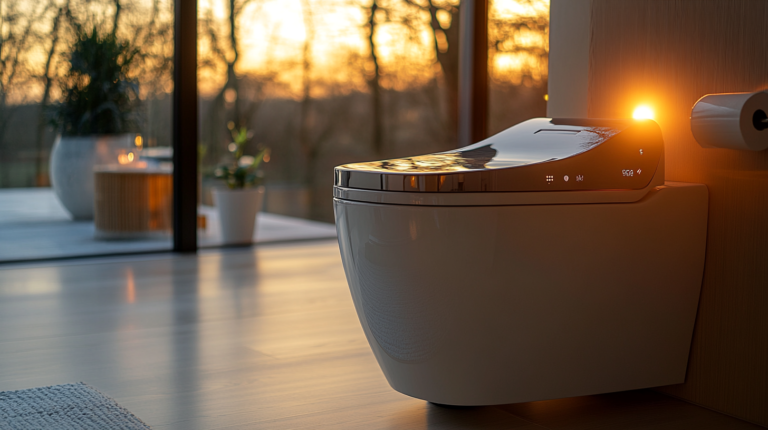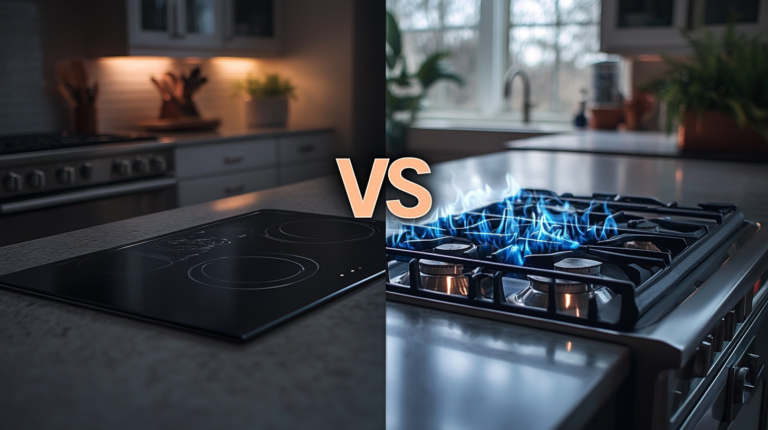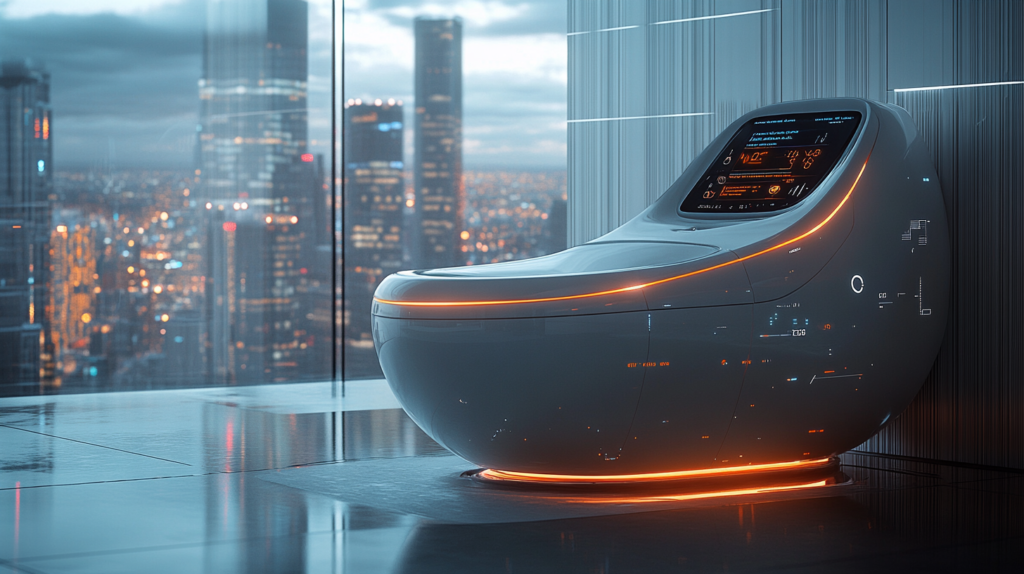
Introduction:
Hey there, health enthusiasts! Gary here, and today we’re diving into a topic that might surprise you – the medical benefits of smart toilets.
These high-tech thrones offer some incredible health advantages:
1) Early disease detection through urine and stool analysis,
2) Continuous monitoring of cardiovascular health,
3) Personalized health insights based on long-term data collection,
4) Improved management of chronic diseases, and
5) Enhanced preventive care through regular health screening.
Imagine catching potential health issues every time you use the bathroom – that’s the power of smart toilets!
Now, I know what you’re thinking. “Gary, have you finally lost it? Toilets can’t be smart!” But hold onto your seats (pun intended), because I’m about to blow your mind with some cutting-edge research and insights into these high-tech health monitors disguised as humble toilets. By the end of this post, you’ll be looking at your bathroom in a whole new light!
Table of Contents:
- 1. Introduction: The Unexpected Health Hub in Your Home
- 2. The Evolution of Smart Toilets: From Luxury to Necessity
- 3. Key Health Monitoring Features of Smart Toilets
- 3.1 Urine Analysis: Your Personal Lab Technician
- 3.2 Stool Analysis: The Scoop on Your Poop
- 3.3 Cardiovascular Health Monitoring: Heartbeats from Your Seat
- 3.4 Biometric Identification: Your Unique Bottom Print
- 4. Medical Benefits and Potential Applications
- 4.1 Early Disease Detection: Catching Problems Before They Catch You
- 4.2 Chronic Disease Management: Your 24/7 Health Assistant
- 4.3 Personalized Health Insights: Know Thyself, Inside and Out
- 4.4 Improved Preventive Care: Staying Ahead of the Health Curve
- 4.5 Assistance for Elderly and Disabled Users: Independence with Dignity
- 5. Challenges and Considerations
- 5.1 Privacy and Data Security: Keeping Your Business Your Business
- 5.2 Cost and Accessibility: Breaking Down the Price Barrier
- 5.3 User Acceptance: Overcoming the “Ick” Factor
- 6. Future Directions: What’s Next for Smart Toilets?
- 7. Conclusion: Embracing the Bathroom Revolution
Alright, folks, let’s talk about the elephant in the room – or should I say, the toilet in the bathroom. For years, we’ve been flushing away valuable health information without a second thought. But what if I told you that your toilet could be your first line of defense against various health issues?
I’ve spent countless hours researching this fascinating topic, and let me tell you, the future of healthcare might just be sitting in your bathroom right now. According to a groundbreaking study by Park et al. (2020) published in Nature Biomedical Engineering, smart toilets are capable of monitoring “10 different biomarkers” in your urine, including “white blood cell count, consistent blood contamination, certain levels of proteins” that can indicate a whole range of health conditions, from simple infections to more serious issues like bladder cancer and kidney failure [1].
2. The Evolution of Smart Toilets

Now, you might be thinking, “Smart toilets? Aren’t those just fancy bidets for the rich and famous?” Well, my friends, times are changing faster than you can say “flush.” What was once considered a luxury item is rapidly becoming a crucial tool in preventive healthcare.
Dr. Sanjiv Gambhir, a pioneer in this field, recalls in a Stanford Medicine News Center article, “Our concept dates back well over 15 years. When I’d bring it up, people would sort of laugh because it seemed like an interesting idea, but also a bit odd” [2]. But who’s laughing now? Certainly not the medical community, which is increasingly recognizing the potential of these high-tech commodes.
3. Key Health Monitoring Features of Smart Toilets
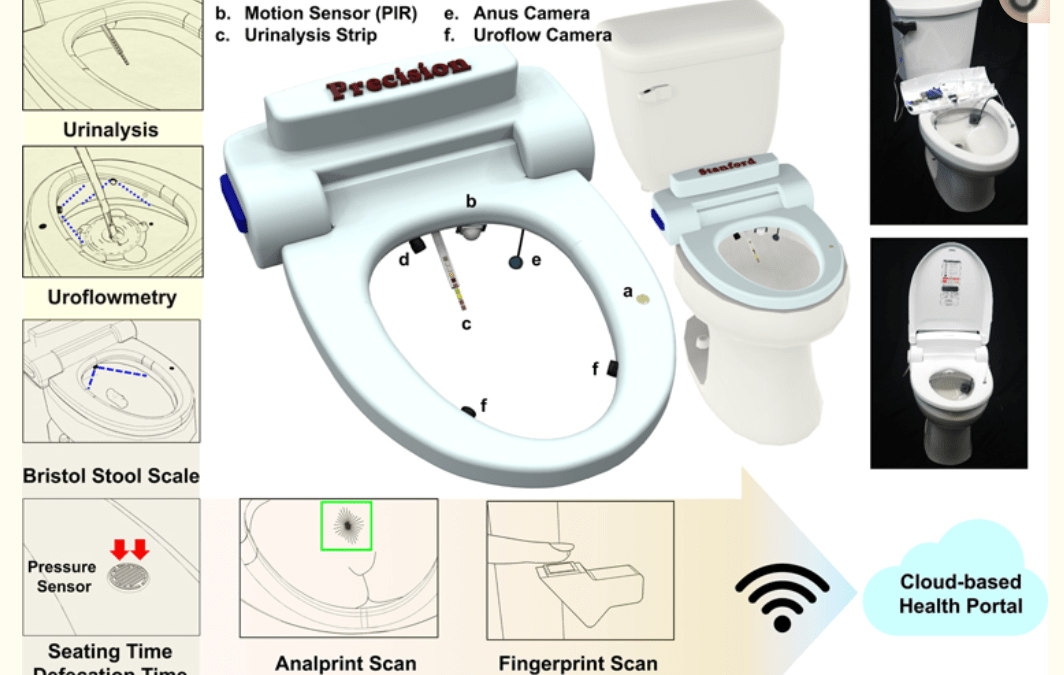
3.1 Urine Analysis: Your Personal Lab Technician
Imagine having a miniature lab technician working 24/7 in your bathroom. That’s essentially what smart toilets offer with their urine analysis capabilities. These toilets can detect various biomarkers in your urine that might indicate underlying health issues. It’s like having a urinalysis every time you pee, but without the awkward cup-handling and doctor’s office visits.
3.2 Stool Analysis: The Scoop on Your Poop
I know, I know, nobody likes talking about poop. But hear me out – your stool can tell you a lot about your health. Advanced smart toilets use deep learning algorithms to classify stool according to the Bristol stool form scale.
As Park et al. (2020) note, the performance of these AI-powered systems is “comparable to the performance of trained medical personnel” [1]. So, next time you do your business, remember – your smart toilet is taking notes!
3.3 Cardiovascular Health Monitoring: Heartbeats from Your Seat
Here’s where things get really interesting. Some smart toilet seats, like the Heart Seat being studied at UMass Chan Medical School, can measure your heart rate, blood pressure, and blood oxygenation levels.
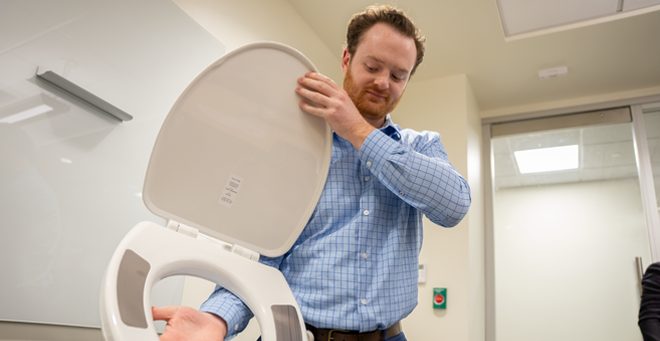
Dr. Apurv Soni, the principal investigator of this study, explains, “If we can accurately predict which patients are going to require an emergency room visit or hospitalization, then we can go from a reactive state of health care to more of a proactive state of health care” [7]. Imagine catching a heart problem while you’re just sitting there, reading the morning news!
3.4 Biometric Identification: Your Unique Bottom Print
Now, I know what you’re thinking – “But Gary, what if I share my bathroom with others?” Well, smart toilets have got you covered (no pun intended).
According to the Stanford University study, “Each user of the toilet is identified through their fingerprint and the distinctive features of their anoderm” [1]. That’s right, folks – your bottom has a unique “print,” and smart toilets can use it to ensure all that health data is correctly assigned to you. Talk about personal identification!
4. Medical Benefits and Potential Applications
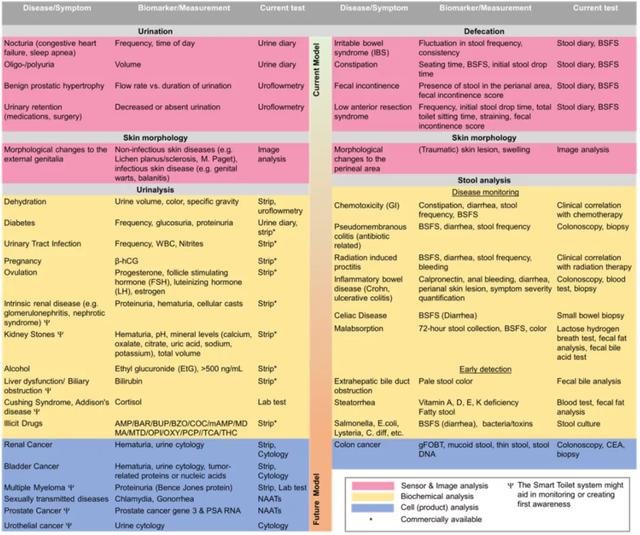
4.1 Early Disease Detection: Catching Problems Before They Catch You
One of the most exciting aspects of smart toilets is their potential for early disease detection. By continuously monitoring your waste output, these high-tech thrones can detect subtle changes that might indicate the onset of various health conditions.
The Nature Biomedical Engineering study suggests that smart toilets could potentially detect “early signs of serious health conditions like cancer or diabetes” [1]. Imagine catching a serious illness in its early stages, all thanks to your toilet!
4.2 Chronic Disease Management: Your 24/7 Health Assistant
For those living with chronic conditions like inflammatory bowel disease, diabetes, or heart failure, smart toilets can be a game-changer. They provide continuous monitoring without the need for frequent clinical visits, aligning perfectly with the growing trend towards remote patient monitoring and telemedicine.
It’s like having a medical professional checking in on you every day, without the hassle of actually going to the doctor’s office.
4.3 Personalized Health Insights: Know Thyself, Inside and Out
By collecting data over time, smart toilets can provide personalized health insights that go beyond what you might get from an annual check-up.
As Dr. Seung-min Park and colleagues note, “The smart toilet is the perfect way to harness a source of data that’s typically ignored — and the user doesn’t have to do anything differently” [1]. It’s passive data collection at its finest, giving you a more complete picture of your health without any extra effort on your part.
4.4 Improved Preventive Care: Staying Ahead of the Health Curve
The continuous health monitoring provided by smart toilets can significantly enhance preventive care strategies.
By detecting potential health issues early, these devices could help reduce hospitalizations and improve overall health outcomes. It’s like having a crystal ball for your health, but instead of mystical predictions, you’re getting solid, data-driven insights.
4.5 Assistance for Elderly and Disabled Users: Independence with Dignity
Smart toilets can be particularly beneficial for elderly or disabled users. Features like automatic lid opening/closing and adjustable height settings can improve accessibility and independence.
As noted by Renoz, “Smart toilets can be a game-changer for elderly or disabled individuals who may struggle with traditional toilets” [4]. It’s not just about health monitoring – it’s about maintaining dignity and independence for those who need it most.
5. Challenges and Considerations
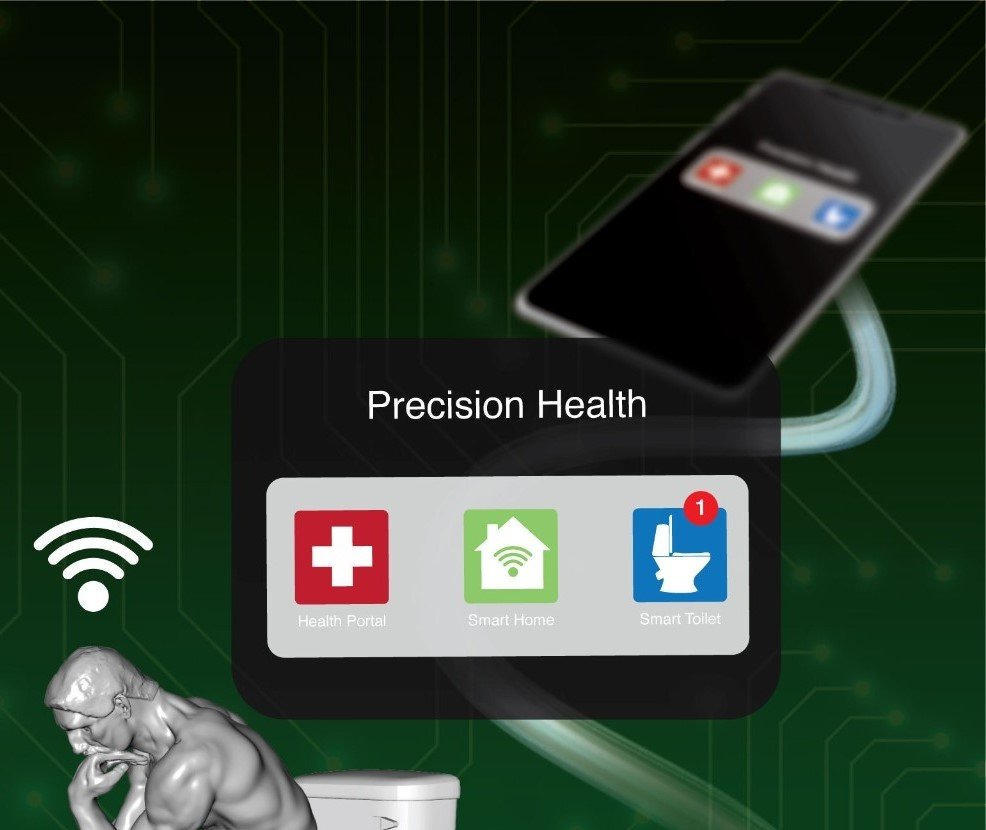
5.1 Privacy and Data Security: Keeping Your Business Your Business
Now, I know what you’re thinking – “Gary, this all sounds great, but what about my privacy? I don’t want my toilet spilling the beans about my… well, beans!” And you’re absolutely right to be concerned. With smart toilets collecting sensitive health data, ensuring privacy and data security is paramount.
As noted in the study by Park et al., “It is important to prioritize establishing an ethical framework for the use of smart toilets as their development for passive health monitoring continues” [1]. Rest assured, the developers of these smart toilets are taking privacy very seriously.
5.2 Cost and Accessibility: Breaking Down the Price Barrier
Let’s face it – right now, many advanced smart toilets come with a price tag that might make your wallet feel a bit lighter. However, as with all technology, we can expect the costs to decrease as the technology becomes more widespread.
As DP Home notes, “As the technology becomes more mainstream, we can expect prices to become more competitive” [5]. So while it might be a bit of an investment now, smart toilets could become as common as smartphones in the near future.
5.3 User Acceptance: Overcoming the “Ick” Factor
I get it – the idea of your toilet collecting health data might make some folks a bit squeamish. A study on older adults’ perceptions of intelligent toilet seats found that psychological concerns, including “embarrassment and aging-related stereotypes,” were significant factors affecting acceptance [3].
But remember, we’ve overcome similar hurdles with other health technologies. It’s all about education and understanding the immense benefits these devices can offer.
6. Future Directions: What’s Next for Smart Toilets?

Hold onto your seats, because the future of smart toilets is looking brighter than a freshly cleaned bathroom! Researchers are working on integrating even more advanced technologies, such as:
- AI and machine learning for more accurate health predictions
- Integration with other smart home and healthcare devices for comprehensive health monitoring
- Advanced molecular analysis capabilities for more detailed health insights
Imagine a future where your toilet, smartwatch, and home assistant work together to give you a complete picture of your health. It’s not science fiction – it’s just around the corner!
Conclusion: Embracing the Bathroom Revolution
Well, folks, we’ve come to the end of our journey through the fascinating world of smart toilets. Who knew that the humble toilet could evolve into such a powerful tool for health monitoring and disease prevention?
From analyzing your urine and stool to monitoring your heart health, smart toilets are transforming our daily routines into opportunities for proactive health management. They’re not just about comfort and convenience anymore – they’re about taking control of your health in the most unexpected of places.
Sure, there are challenges to overcome, like privacy concerns and initial costs. But the potential benefits – early disease detection, better chronic disease management, personalized health insights – are too significant to ignore.
So, the next time you’re sitting on your throne, take a moment to imagine the possibilities. The future of healthcare might just be right beneath you. And remember, in the world of smart toilets, every flush could be a flush towards better health!
Until next time, this is Gary, reminding you to stay curious, stay healthy, and maybe, just maybe, start saving up for that smart toilet. Your future self (and your doctor) will thank you!
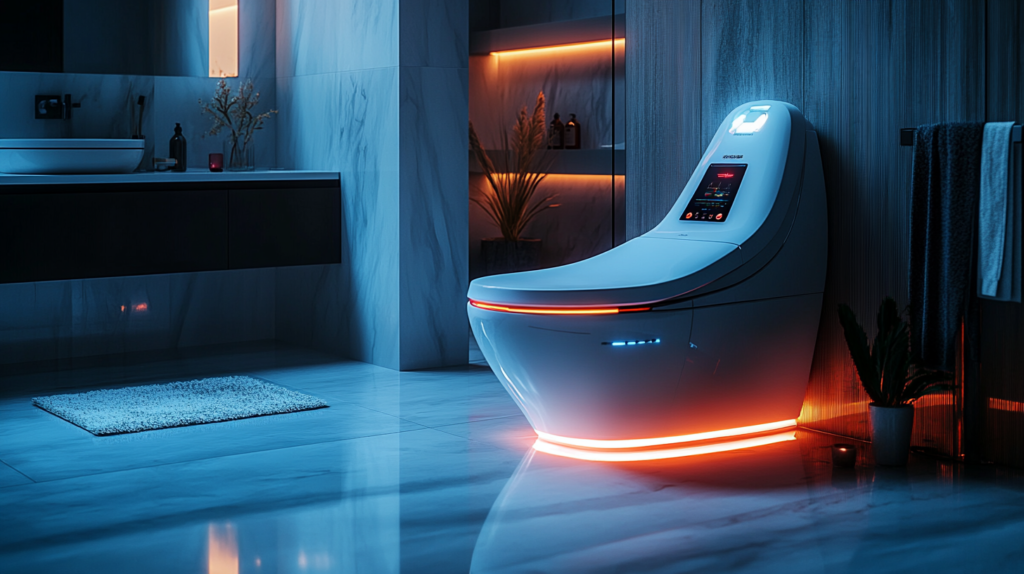
Source References:
[1] Park, S. M., et al. (2020). A mountable toilet system for personalized health monitoring via the analysis of excreta. Nature Biomedical Engineering, 4(6), 624–635. https://doi.org/10.1038/s41551-020-0534-9
[2] Armitage, H. (2020, April 6). ‘Smart toilet’ monitors for signs of disease. Stanford Medicine News Center. https://med.stanford.edu/news/all-news/2020/04/smart-toilet-monitors-for-signs-of-disease.html
[3] Srinivasan, S., et al. (2023). Older Adults’ Perceptions About Using Intelligent Toilet Seats Beyond Traditional Care: Web-Based Interview Survey. JMIR mHealth and uHealth, 11, e46430. https://doi.org/10.2196/46430
[4] Renoz. (2023, June 13). Why are smart toilets good? The advantages of smart toilets. Retrieved from https://renoz.ca/blogs/news/why-are-smart-toilets-good-the-advantages-of-smart-toilets
[5] DP Home. (2024, April 18). The Future of Bathroom Technology: An In-Depth Look at Smart Toilets. Retrieved from https://dphome.my/blogs/smart-toilet/the-future-of-bathroom-technology-an-in-depth-look-at-smart-toilets
[6] Coprata. (2023, Feb. 21). Why Everyone Should Have a TRULY Smart Toilet. Retrieved from https://www.coprata.com/post/why-everyone-should-have-an-actually-smart-toilet
[7] UMass Chan Medical School. (2023, June 15). UMass Chan digital medicine study uses smart toilet seat to monitor heart health. UMass Chan Medical School News. Retrieved from https://www.umassmed.edu/news/news-archives/2023/06/umass-chan-digital-medicine-study-uses-smart-toilet-seat-to-monitor-heart-health/
Image References:
Fully Automated Smart Toilet Mount for Continuous Human Health Monitoring – Stanford TechFinder
UMass Chan Medical School. (2023, June 15). UMass Chan digital medicine study uses smart toilet seat to monitor heart health. UMass Chan Medical School News.


